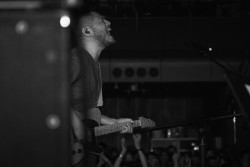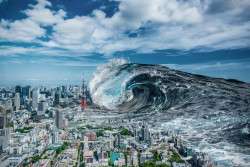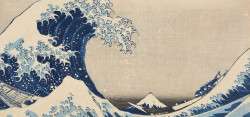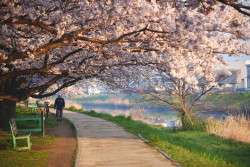
April 30, 2009
The Rainmaker
Author Barry Eisler has found gold on the mean streets of Tokyo with six books about Japanese-American assassin John Rain. Now the action is coming to the big screen
By Metropolis

Kippei Shiina as John Rain, with Kyoko Hasegawa
Eisler thinks Tokyo is an amazingly cinematic city, especially at night. “The lights form the city’s nocturnal character. You have back alleys lit up by glow. Then look at the stadium lights or all the neon you get around Dogenzaka. There is so much variety in lighting; it’s tailor-made for a movie.”
But as much as Eisler loves Tokyo, he does have three gripes: the summer heat, the lack of street names and, his pet peeve, smoking in coffee shops. “I really wish the country would catch up to the West in its respect for nonsmokers. Take these coffeehouses. There is nowhere on earth where coffee is made with greater reverence than here. I want to ask those people smoking at the next table how they can enjoy the subtle qualities of these wonderful cups of coffee. It’s a tragedy.”
In between all his interviews and book signings, Eisler is trying to find time to work on the sequel to Fault Line, a thriller set in Silicon Valley involving a government conspiracy. Over the years, the author has attracted criticism for the political overtones of his books. “A lot of people posting on Amazon or in emails to my website ask me why I hate America,” he says. “When did criticism of the government start to become the same as criticism of America itself? That is a very strange notion to me and very un-American. I love my country.”
Despite his critics, Eisler has attracted a growing fan base. “I have over 20,000 MySpace friends, 3,000 Facebook friends, and about 1,000 on my website discussion board,” he says. One of the most frequently asked questions is about his CIA experiences, and if he likes to put the boot into the organization because he worked there.
“The answer to that is no. Back then, I never felt that an attack on the CIA was an attack on me. Nowadays, I often get asked what I did at the CIA. Well, I haven’t run a coup in quite a few years, so I’m quite a bit rusty,” he jokes. “Actually, I had a covert position, [so] when I left in 1992, I had to keep my cover. That’s routine. Around the time of my fourth book, my publisher wondered if it would be a better promotion for the books if readers didn’t get the feeling that I worked for the post office. So I asked for a change in status, and now I can at least say where I worked.”
Eisler seeks out help from experts to help make his stories realistic. Rain, for example, specializes in making hits look like natural deaths. “Doctors are a good research source for that. They are always reluctant at first to talk about how you could kill someone and make it look like they died of natural causes. Cops are another great source. At first, they, too, tend to be reluctant to talk about how you would get away with murder. But once they get going, they really get into it.”
When he’s not writing, Eisler likes to indulge his passions of jazz and martial arts. He got a black belt in judo while living in Japan in the ’90s, and he’s currently training in Brazilian jiu-jitsu. “Martial arts can be a useful part of a self-defense system, but they are the least cost effective and innermost layer of any kind of real self-defense,” he says. “The outer layers are awareness and deterrence. The most cost effective way to learn to defend yourself is to learn to understand where, when and how violence occurs—and then avoid those situations. Martial arts won’t help you punch your way out of an ambush. If you ask John Rain what has kept him alive all these years, he would say avoiding [trouble]. When the punch comes, don’t be there.”
So after six books, is that the end of Rain? “It’s hard to switch off Rain, especially when I am in a coffeehouse like this in Tokyo. It’s second nature for me to look at a place through Rain’s eyes. The character is now in his late 50s. What makes him appealing for me are the changes he is going through as he ages. He was pretty messed up psychologically at the end of the last book, so who knows?”
For more info on Barry Eisler and the John Rain series, see www.barryeisler.com.
John Rain’s Tokyo haunts
- Ben’s Cafe 1-29-21 Takadanobaba, Shinjuku-ku. www.benscafe.com
- Blue Note Tokyo 6-3-16 Minami-Aoyama, Minato-ku. www.bluenote.co.jp
- Body & Soul (jazz bar) B-1, 6-13-9 Minami-Aoyama, Minato-ku. www.bodyandsoul.co.jp
- Cafe Peshaworl 3-1-4 Nihonbashi, Chuo-ku. Tel: 03-3242-1212
- Club Alfie (jazz bar) 6-2-35 Roppongi, Minato-ku. http://homepage1.nifty.com/live/alfie
- Christie Tea & Cake 1-16-1 Jingumae, Shibuya-ku. Tel: 03-3401-2866
- D-Heartman (bar) 4F, 6-5-17 Ginza, Chuo-ku. www.ginza.jp/heartman/
- Ginza-yu (bathhouse) 1-12-2 Ginza, Chuo-ku. Tel: 03-3561-2550
- Hatou (café) 1-15-9 Shibuya, Shibuya-ku. Tel: 03-3400-9088
- Jardin de Luseine (French restaurant) 1-15-14 Jingumae, Shibuya-ku. www.luseine.com
- Las Chicas (restaurant/lounge) 5-47-6 Minami-Aoyama, Minato-ku. www.vision.co.jp
- Monsoon Café 2-10-1 Nishi-Azabu, Minato-ku. Tel: 03-3400-7200
- Old Imperial Lounge Imperial Hotel, 1-1-1 Uchisaiwai-cho, Chiyoda-ku. www.imperialhotel.co.jp
- Rue Favart (café) 3-28-12 Ebisu, Shibuya-ku. Tel: 03-5421-0688
- These Library Lounge 2-15-12 Nishi-Azabu, Minato-ku. www.these-jp.com
- Tsukumo Ramen 1-1-36 Hiroo, Shibuya-ku. Tel: 03-5466-9566
- Tsuta Coffee Shop 5-11-20 Minami-Aoyama Minato-ku, Tel: 03-3498-6888
- Volontaire (jazz bar) 6-29-6 Jingu-mae, Shibuya-ku. Tel: 03-3400-8629







